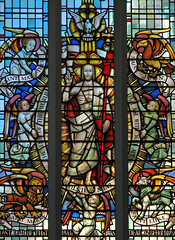 Image via Wikipedia
Image via Wikipedia
The early Church was a community which was credible and attractive to others because it gave testimony to the presence and action of the Lord. This resulted in a great increase in the number of believers in the early Church.
In the reading from Revelation, John reflects on the meaning and significance of his union with Christ and the union of Christians in the Lord. It is a union in suffering and glory. According to John, Jesus and the Christian do not pass through suffering into glory. Rather, for Jesus and the Christian, suffering and glorification occur in the same moment. In other words, in the suffering is the glorification.
The reading also reminds us of the presence of the Risen Lord in our ministry. John’s vision stresses the presence of the Lord among us. The glorified Lord is always with the Church as he interprets the meaning of events and gives new life to hispeople. Jesus is present and active in our lives and in the community.
In the two appearances of the Risen Lord to his disciples as recorded in John’s gospel, Jesus invites the unbelieving disciples to a new level of belief. In the first episode, the frightened disciples were filled with joy when they heard the words of peace spoken by Jesus. They believed in his new presence among them and
because of this renewed faith, they were sent forth to continue his mission. Believing is therefore more than an affirmation of faith in Jesus. It is actively continuing the mission of Jesus. The Risen Lord assures us that he will continue to be with us in his Spirit. It is in the reality that we celebrate the Easter liturgies.
The second appearance of Jesus to his disciples speaks of believing in Jesus.. The story of Thomas’ “unbelief” reminds us of ourselves. Thomas would not believe in the presence of the Risen Lord on the testimony of others. We remember Thomas being mentioned several times in the gospel. At the time of Lazarus' death in Bethany, Thomas said,“Let us go and die with him.” During the Last Supper,he had some difficulty understanding Jesus. “Lord, we do not know where you are going, so how can we know the way?” Thomas seemed again to struggle in his faith and needed a sign of his own choosing – a sign that would confirm Jesus’ death and resurrection. However, the doubt of Thomas was the prelude to a great confession of belief: “My Lord and my God.”
Today’s readings end with a clarification of what believing in Jesus is all about. When we believe in Jesus, we have life in his name. The reading identifies for us the focus of our belief and urges us to believe in Jesus. And our belief can only be an effectual sign if it is expressed in relationship with and service of others within and beyond our community.
The above article is taken from the bulletin of the St Francis Xavier Church - Serangoon.
![Reblog this post [with Zemanta]](http://img.zemanta.com/reblog_e.png?x-id=7293529e-f82a-49e9-9c11-83911d874dfe)

![Reblog this post [with Zemanta]](http://img.zemanta.com/reblog_e.png?x-id=24dd3401-42f2-4a1e-ba6b-0029f12df83e)

![Reblog this post [with Zemanta]](http://img.zemanta.com/reblog_e.png?x-id=eae9eb58-2269-47be-b04a-aa09102700f2)

![Reblog this post [with Zemanta]](http://img.zemanta.com/reblog_e.png?x-id=69140190-902e-4356-aba8-8e07f4b7f155)

![Reblog this post [with Zemanta]](http://img.zemanta.com/reblog_e.png?x-id=b5ffed74-051b-4fd7-acd0-f77f46e95cb4)

![Reblog this post [with Zemanta]](http://img.zemanta.com/reblog_e.png?x-id=9d0b745c-1225-4c24-95d2-8079a256c6a0)

![Reblog this post [with Zemanta]](http://img.zemanta.com/reblog_e.png?x-id=fce6bc94-c006-454d-9524-66de49e299b7)

![Reblog this post [with Zemanta]](http://img.zemanta.com/reblog_e.png?x-id=e37510f3-5f6e-4233-9fe8-b00b863f30b2)

![Reblog this post [with Zemanta]](http://img.zemanta.com/reblog_e.png?x-id=b6444c73-fc00-4bd0-af05-8d3603052afb)




